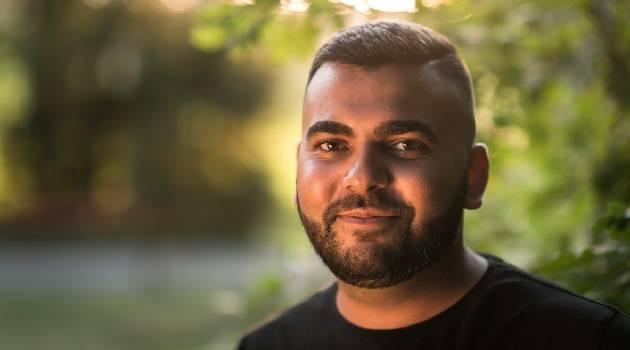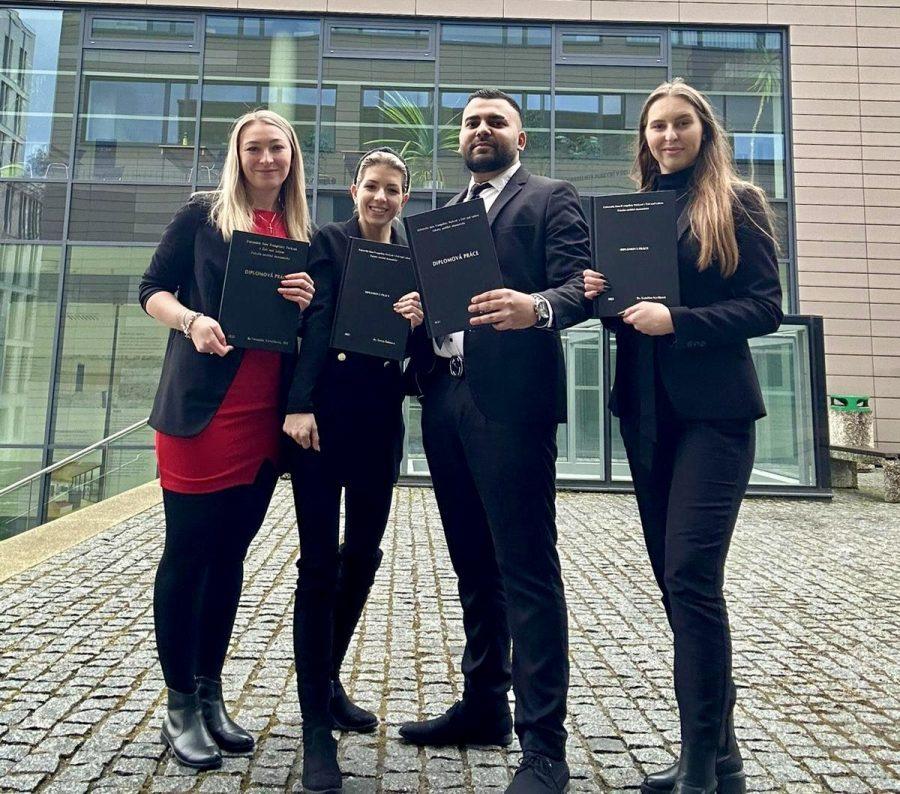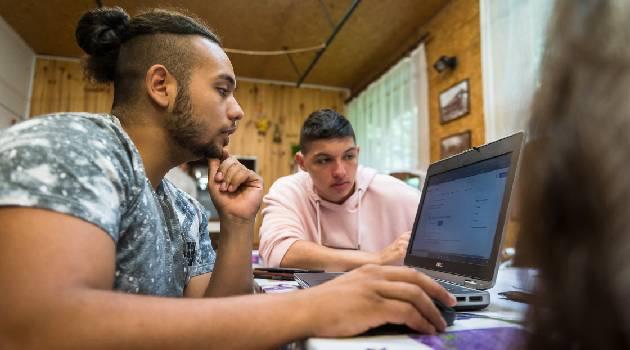Roma in the Czech Republic five times less likely to be considered as prospective tenants than non-Roma

"My mother was the one who supported me the most in my studies. She herself just has a basic education and she knows very well how difficult it is to apply herself with it, and not only on the labor market. She would have supported me even if I hadn't chosen the European Business Academy and went to vocational school instead," says newly-graduated engineer Robin Štrobach (26), who has just defended his master's thesis at the Faculty of Social and Economic Studies, J. E. Purkyně University.
Q: You’ve been studying Business Economics and Management, and the subject of your thesis was “Ethnic and Gender Discrimination on the Czech Private Rental Housing Market”. That might seem more like a theme for a field in the humanities, why did you choose it?
A: This subject has long interested me, I already concentrated on it when I did my bachelor’s degree. For my master’s I decided to move forward with it in several directions. I researched whether differences exist based on the ethnic origin or sex of those applying to access the Czech rental housing market, whether more information about prospective tenants aids with reducing the degree of their discrimination, and I focused especially on the gender aspect and expanded the scope of my survey to include the Pardubice and South Moravian Regions.
Q: How did the research work, how did you acquire the data for assessment?
A: I made use of an experiment that ran from November 2021 to April 2022. All of it was based on the willingness of landlords to invite applicants to view an apartment or request further contact with them. First I created identities for fictional applicants (12) which were quite essential, the landlord had to be able to immediately recognize the ethnicity and sex of each one. Then I created all but identical profiles for all of the applicants (the greeting they used in their communication, expression of interest in the apartment for rent, sometimes more information). However, the templates differed by the name that was signed. Then I looked for apartments for rent online in the Moravian-Silesian, Pardubice, South Moravian, Ústecký and Zlín Regions and in Prague. Overall I sent out 1,800 requests to view an apartment.

Q: What kinds of responses came back from the landlords?
A: None of the landlords’ responses were coarse, or insulting, or racist, but very often the “Romani” applicants got an answer containing an expression of regret (compared to the “non-Romani” ones). However, I had to rule out several advertisements from the start for housing where the advertiser wanted to rent an apartment just to women – there would have been no point to including such a landlord.
Q: How did gender discrimination fit into your work?
A: I was interested in which factors might influence discriminatory behavior – education, ethnicity, region or sex in particular. To be clear, sex is not absolutely the same as gender, which is your “social sex”, i.e., a concept that indicates the cultural characteristics and models attributed to either the female or male sex that mark the social differences between men and women. The concept of “sex” is about differences that are conditioned purely by biology. My work was not interested in resolving the differences between these concepts, but generally in who has a bigger chance of successfully applying to rent housing. Previous research has documented that those most preferred on the housing market are majority-society women, while those most disadvantaged are men belonging to a minority.
Q: What were the results of your research?
A: Of a total of 1,800 requests, the prospective tenants got 1,185 positive answers, 738 of which said yes to “non-Romani” applicants while 447 said yes to “Romani” ones. Landlords most frequently contacted names that sounded like majority-society women, and contacted names that sounded like minority men least. The experiment proved the influence of education, ethnicity, region and sex on Romani people’s chance of getting a positive response from a landlord. For the non-Roma, just the influence of sex was proven. Another factor I followed was social status. It was anticipated that applicants with higher status would get more positive answers compared to those with lower status. What was ascertained was that providing positive information about the employment of potential tenants increased the chance that “Romani” applicants would be contacted. However, this still does not do enough to compensate for the negative influence of a Romani name, whereby higher-status Roma, for example, accountants or teachers, got fewer positive responses than “non-Romani” applicants with lower status, such as assistant cooks or cleaning women, or “non-Romani” applicants who did not describe a profession. Ethnic discrimination is, therefore, more essential and intensive than discrimination based on gender or social class.

Q: For Romani people, therefore, it depends more on how much information they present about themselves when answering an advertisement?
A: Yes, it also depends on what kind of information it is – what kind of education those applying for housing had, what their employment position was. It also depends on their geographic location. “Romani” applicants succeeded the least in being invited to view an apartment in the Moravian-Silesian, South Moravian and Ústecký Regions, i.e., the regions where the most Romani people in the Czech Republic declare their ethnicity. In the Pardubice and Zlín Regions, as well as in Prague, the “Romani” applicants succeeded in getting more positive reactions from landlords. The most apparent differences were recorded in the Ústecký Region, where “non-Romani” applicants got 48 % more responses than “Romani” ones. The most positive responses for “Romani” applicants were in the Pardubice Region, specifically, to 63 % of such applications. Despite this, however, “non-Romani” applicants were more successful in the attempt to acquire housing in all the regions surveyed.
Q: If we were to summarize, who has the biggest and the least chances according to the findings of this survey?
A: The most successful applicants for housing were the “non-Romani” women, while the least successful applicants were the “Romani” ones who provided no information on their profession, or those with lower status, irrespective of their sex, who were looking for housing in the Moravian-Silesian, South Moravian or Ústecký Regions. As far as the employment position was concerned, an applicant with higher social status has twice as much of a chance of receiving a positive reaction than an applicant who does not provide such information. “Non-Romani” applicants have five times more of a chance of being invited by a landlord to view an apartment than do “Romani” ones. My research also naturally had its limits, though. This study just provides a view of the discrimination happening during the earliest phases of the process of applying for rental housing. It cannot draw conclusions about how the landlords would decide further on who would actually rent a unit – it concentrated on who would and would not be invited to view an apartment by landlords.
Q: If we consider the longstanding atmosphere in society and its mindset vis-a-vis Romani people, these results aren’t very surprising…
A: That’s how it is. The most frequent causes of discriminatory behavior in the field of housing are ignorance of information about a prospective tenant that might be relevant, and prejudices. For example, between “applicants” named “Gejza Balog” [Translator’s note: A Romani man with no social status indiciated in his name] and “Mgr. Nikolas Čonka” [Translator’s note: A Romani man using a title indicating a master’s degree] the difference in positive reactions from potential landlords was 30 %, which represents one times as many responses for an educated “Romani” person compared to one with no information on social status in the name. This result is unsurprising. Those “non-Romani” applicants which provided no information on social status received more positive responses than “Romani” ones with either higher or lower social status, which is also not surprising.

Q: Your research, therefore, shows that education (and not just that factor) plays an important role in successfully finding housing. You yourself are a volunteer with a motivational program in the primary schools as a mentor, you also contribute to organizing the BARUVAS student gatherings that are part of ROMEA’s scholarship program. What, in your view, is the main motivation for Romani youth to continue their educations?
A: I regularly travel to give motivational talks to primary school pupils. I perceive it as quite important and necessary, motivation is very important, at least to me. However, above all, the pupils themselves have to want this, and if so, I am willing to aid them in any way that I can. My wish is that there will be even more educated Romani people – doctors, IT analysts, lawyers, teachers – in the Czech Republic. I am hopeful about the younger generation of Roma, but it’s necessary that they realize even more deeply what they want to achieve. Their parents frequently just have primary educations, but that’s the same as in my case – all you need is the impulse to change that.
For me it was fundamentally important that I successfully applied to the Romani Scholarship Program and thanks to BARUVAS, I got this opportunity to meet other Romani students and share my experiences with them. I knew there were a lot of Romani students, but until then I’d never had the option of meeting them in person and getting to know them. I’ve made many brilliant new friends who share my same aims. The scholarship isn’t just about money. I learned a lot of new information about the history of Romani people that I’d never had the possibility to learn about in school.
Q: You mentioned your family situation. Your single mother is caring for and raising five children, how did she approach your going to study?
A: My mother was the one who supported me the most in my studies. She herself just has a basic education and she knows very well how difficult it is to apply herself with it, and not only on the labor market. She would have supported me even if I hadn’t chosen the European Business Academy and went to vocational school instead. I was also lucky in the other people who were and still are role models for me, such as Mr. Miroslav Grajcar, who ran the Center for Children and Youth (Centrum dětí a mládeže) in an excluded locality. I visited the center all throughout primary school, I attended its recreational activities and spent my free time in a meaningful way. When I needed advice about how to apply to secondary school, I went to Mr. Grajcar. My teachers are also some of my role models.

Q: What do you want to do next?
A: I would love to become a good teacher myself. When we were children, I used to play “school” with my cousins and siblings, even during our vacations. I never played the role of a pupil, I was always the teacher. I think that was exactly because I myself actually met brilliant teachers, I always felt good at school. It didn’t matter whether the help came from my English teacher, or my homeroom teachers in primary and secondary school, or from the supervisors of my bachelor’s and master’s. I thank them all very much. My youngest brother will enroll into first grade this year – I will aid and support him, I’d like to be a role model for him. Maybe he will be an engineer someday, or maybe even get a master’s degree or a Ph.D.
Q: What’s your message for Romani youth who are deciding right now whether to apply to secondary school or to a college or university, but who don’t believe in themselves much?
A: They should believe in themselves! Everybody encounters obstacles in life, it’s up to us to overcome them and keep pursuing our aim. All you have to do is want it.
